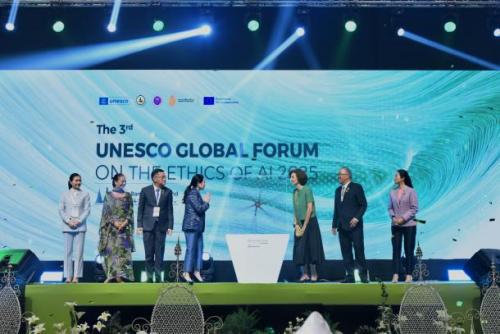
https://www.unesco.org/en/articles/bangkok-sets-pace-ai-ethics-highlight...

Building on the 1st Global Forum in Prague, Czech Republic, in 2022, and the 2nd in Kranj, Slovenia, the 3rd Global Forum in 2025 continued UNESCO’s mission to advance the adoption of its groundbreaking 2021 Recommendation on the Ethics of AI, the first and only global normative framework on AI ethics. This was the first time the Global Forum travelled to the Asia‑Pacific region, home to 60 % of the world’s population and the fastest‑growing digital market. The Host Country, Thailand, is one of 70+ countries graduating from UNESCO’s Readiness Assessment Methodology (RAM). I welcome the opportunity to work closely with Thailand, one of the world’s most connected nations, to translate the UNESCO Recommendation on the Ethics of Artificial Intelligence into concrete national policies. This third UNESCO Global Forum, organized for the first time in the Asia-Pacific region, notably marks the expansion of the implementation of our Recommendation on the Ethics of AI to over 70 countries, including seven in Southeast Asia High-level discussions were also informed by the insights generated from UNESCO’s Readiness Assessment Methodology (RAM), as Ministers discussed how national strategies must be grounded in local realities, supported by strong institutions, and shaped through inclusive, cross-sector collaboration. UNESCO is supporting 7 out of 10 ASEAN countries to implement the Readiness Assessment Methodology (RAM), including Cambodia, Lao PDR, Thailand, Vietnam, Philippines, Indonesia, and Malaysia. The RAM not only helped to identify capacity gaps, but also to align national priorities with the only global standard on the ethical governance of AI in a rapidly evolving landscape. As leaders, it is our shared duty to ensure that AI delivers real, inclusive, and lasting benefits for all. The Global Forum also launched major initiatives, reinforcing UNESCO’s role as a leading convener on AI ethics. The newly established Global Network of AI Supervisory Authorities, developed in collaboration with national regulators, including the Dutch Authority for Digital Infrastructure (RDI), will share knowledge and build capacity to implement AI policies. The Global Network of Civil Society and Academia was also launched to support citizen participation in AI-related decision-making worldwide. By uniting diverse voices and pairing bold ideas with practical tools, the Global Forum has shown how global cooperation can keep AI inclusive, accountable, and human‑centred. Looking ahead, UNESCO remains committed to shaping a future where ethical principles guide AI development for the benefit of all and invites governments, businesses, and citizens to join its efforts.











